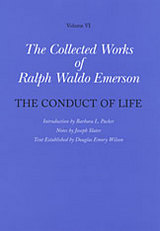
The essays in this book, first published in 1860, were developed from a series of lectures on "The Conduct of Life" delivered by Emerson during the early 1850s. Some of the original lectures were dropped and the rest were considerably revised, with new topics introduced. The published essays, on "Fate," "Power," "Wealth," "Culture," "Behavior," "Worship," "Considerations by the Way," "Beauty," and "Illusions," show Emerson's interest in many practical aspects of human life, and reflect his increasing involvement in politics--chiefly in the antislavery movement--during the decade before the Civil War.
This edition is based on Emerson's holograph manuscripts and published sources. The text incorporates Emerson's later corrections and revisions, and shows us what he actually wrote (or, perhaps in some cases, intended to write).
The historical introduction traces the book's development and its relation to Emerson's own personal growth and political awareness. Joseph Slater's explanatory notes help the modern reader to understand many of Emerson's references and allusions that may not be readily apparent.
Historical Introduction by Barbara L. Packer
Notes by Joseph Slater
Text Established and Textual Introduction and Apparatus by Douglas Emory Wilson


Emerson traveled broadly in England and Scotland in 1833 and again on lecture tour fifteen years later. Drawing on his experiences there as well as his wide reading in British history, he set forth in English Traits his view of the English as a nation. Published in 1856, this was one of his most popular books, perhaps because of its playfulness and wit and clarity of style.
English Traits is a searching and distinctive portrayal of English culture that today offers a revealing perspective on American viewpoints and preoccupations in the mid-nineteenth century. It is notable, too, for revealing an interesting side of Emerson's complex character; here we find Emerson the practical Yankee, analyzing English power, resourcefulness, determination, and materialism.
The historical introduction to this fullscale critical edition, places English Traits in the context of Emerson's career and travels, and discusses the book's contemporary reception. The explanatory notes provide a treasury of helpful information. This is the definitive scholarly edition of English Traits.
Historical Introduction by Philip Nicoloff
Notes by Robert E. Burkholder
Text Established and Textual Introduction and Apparatus by Douglas Emory Wilson

In 1845 Emerson delivered a series of lectures entitled "Uses of Great Men; Plato, or the Philosopher; Swedenborg, or the Mystic; Montaigne, or the Skeptic; Shakespeare, or the Poet; Napoleon, or the Man of the World; and Goethe, or the Writer." Emerson's approach to his great men stands in interesting contrast to that of his friend Carlyle in his Heroes and Hero Worship of 1841.
Although by 1845 Emerson had been lecturing for over ten years, Representative Men, published in 1850, was the first of his works to consist of his lectures as delivered, with only minima! revision and expansion. The book retains the immediacy of the spoken word, and the freedom and daring inspired by a live audience.
This critical edition is based on Emerson's holograph manuscript, which served as printer's copy for the first American edition, collated with subsequent editions and with Emerson's own corrections. The historical introduction relates the book to Emerson's life and times and discusses its literary origins, composition, and contemporary reception. A textual introduction and apparatus have been provided by the textual editor, and there are full informational notes. The volume has been awarded the seal of the Center for Scholarly Editions
Joseph Slater, General Editor
Douglas Emory Wilson, Textual Editor
READERS
Browse our collection.
PUBLISHERS
See BiblioVault's publisher services.
STUDENT SERVICES
Files for college accessibility offices.
UChicago Accessibility Resources
home | accessibility | search | about | contact us
BiblioVault ® 2001 - 2024
The University of Chicago Press









